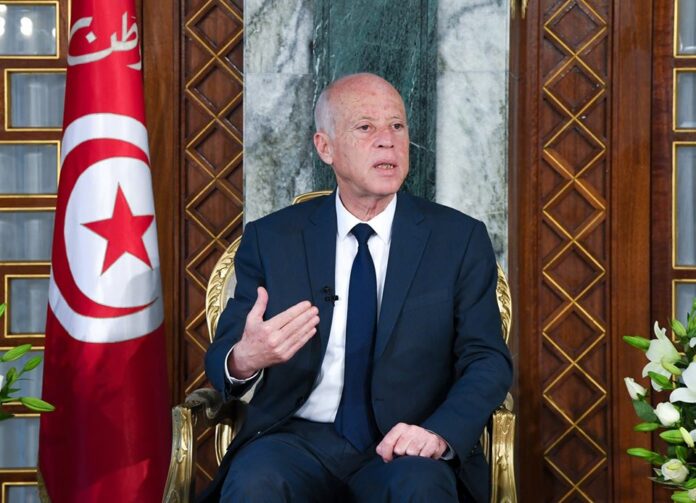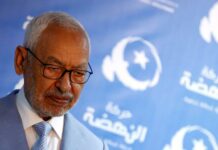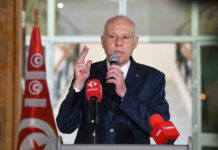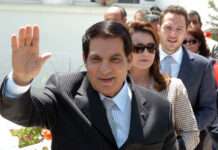President Kais Saied informed his French counterpart Emmanuel Macron that a national dialogue will take place soon in Tunisia. However, it is noteworthy that this information was contained in the Elysee Palace communiqué and was absent from the Carthage Palace communiqué, which clearly indicates its importance as an urgent request made by Macron.
The same thing happened on the seventh of last August, when a statement issued by the French presidency announced that the president had pledged to present a road map for the next stage as soon as possible, which has not been achieved so far.
It is clear that the Tunisian president rejects all forms of pressure. He is stubborn when it comes to his convictions and positions, and this is what he has expressed on several occasions, but he does not want to cut bridges of communication with foreign partners.
Talking about the possibility of moving towards a national dialogue in Tunisia sparked widespread controversy: When is the dialogue? Which parties will participate in it?
We all remember the experience of the National Dialogue in 2013 led by four national organizations that won the 2015 Nobel Peace Prize, namely the Tunisian General Labor Union, the Tunisian Union of Industry and Trade, the Deanship of Lawyers and the Tunisian League for Human Rights. So it is a dialogue that brought together workers, employers, human rights activists and jurists all at once.
That dialogue had succeeded in overcoming a severe crisis at that time, after the assassination of two well-known fierce opponents of the Muslim Brotherhood’s rule (i.e. Ennahda Movement), namely Chokri Belaid and Mohamed Brahmi, and took the country out of the square of total chaos. But it was the reason for ratifying the 2014 constitution, which led to most of the subsequent crises. It was also behind the alliance of the Ennahda movement with Nidaa Tounes as a result of international pressure, one of the most prominent signs of which was the mysterious meeting in August 2013 between Rached Ghannouchi and Beji Caid Essebsi in Paris, which led the country to a disastrous consensus, the most prominent victim of which was the Nidaa Tounes party, which won the 2014 elections, and which reached the stage of disintegration before ending the parliamentary term.
Certainly, President Kais Saied knows that Ennahda has a superior ability to exploit weaknesses not only in its political opponent, but even in its ally. All its allies over the past ten years have ended in total collapse.
In addition, Kais Saied does not like to deal with parties nor does he see an interest in them. Actually, he is intellectually convinced that the time of parties is over, a conviction that began to spread widely in most countries that depend on the system of representative democracy where the citizens’ interest in politics and elections declined.
Saied also holds his country’s parties responsible for the state of devastation the country has reached, not to mention the spread of corruption and the transformation of Parliament into an arena of conflict, covering up the corrupt and approving suspicious laws.
Kais Saied puts all in one basket, as he does not trust the current political elite and is dissatisfied with almost all parties. He also believes that the electoral law in its current form helps push the losers, the corrupt and the opportunists to power. He also believes that the constitution needs fundamental amendments, and that the political system adopted since 2011 is invalid and cannot be relied upon to achieve any reform.
The president does not want his project to be associated with any party, and he absolutely refuses to be affiliated with any party or to be credited with any party. He wants to be independent from everyone, content with having a broad popular base that goes beyond the parties and the House of Representatives, and is ready to assume his responsibility in managing the next stage according to what he deems fit and without needing opinion or advice from outside the circle surrounding him, which is not only trustworthy, but it also shares his intellectual convictions and vision for the country’s political, economic and social future.
With whom will the president’s dialogue be?
The answer is clear and does not require much diligence: Kais Saied will not negotiate with the Ikhwan (Brotherhood) and will not sit with the parties! Rather, he will consult with the organizations that will be in contact with the government, led by the Tunisian General Labor Union, the Tunisian Union of Industry, Trade and Handicrafts, the Tunisian Union of Agriculture and Fishing, and the Union of Women. He will also hold meetings with some academics and experts in various disciplines related to the constitution, the economy and finance, but the broader scope will be to meet with youth representatives, especially in the interior regions.
President Saied believes that his future project depends mainly on the youth groups that were behind his candidacy for the presidency, as well as his victory in it. He relies on these groups to implement his reform vision for the future, a vision he knows will encounter many barriers and obstacles, especially from parties and some lobbies, but he will seek to impose it through the people who trust him and whom he defends tirelessly, especially the youth who will have a leading position in any upcoming national dialogue.











